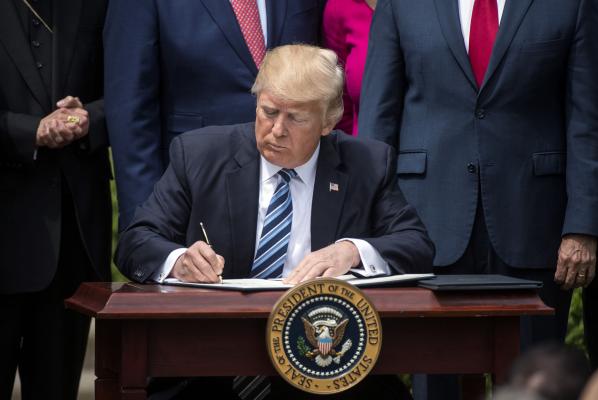U.S. tax code cleared a critical hurdle when the Senate approved a budget blueprint for the 2018 fiscal year that will pave the way for Republicans to pursue a tax-cut package without Democratic support.
By a 51-to-49 vote, the Republican-controlled Senate approved the budget measure, which would add up to $1.5 trillion to the federal deficit over the next decade in order to pay for proposed tax cuts.
But Democrats are likely to oppose the Trump administration’s tax plan, which promises to deliver up to $6 trillion in tax cuts to businesses and individuals.
The Senate measure contains a legislative tool called reconciliation, which would enable Republicans, who control the 100-seat Senate by a 52-48 margin, to move tax legislation through the Senate on a simple majority vote.
U.S. tax code cleared a critical hurdle when the Senate approved a budget blueprint for the 2018 fiscal year that will pave the way for Republicans to pursue a tax-cut package without Democratic support.
By a 51-to-49 vote, the Republican-controlled Senate approved the budget measure, which would add up to $1.5 trillion to the federal deficit over the next decade in order to pay for proposed tax cuts.
But Democrats are likely to oppose the Trump administration’s tax plan, which promises to deliver up to $6 trillion in tax cuts to businesses and individuals.
The Senate measure contains a legislative tool called reconciliation, which would enable Republicans, who control the 100-seat Senate by a 52-48 margin, to move tax legislation through the Senate on a simple majority vote.
U.S. tax code cleared a critical hurdle when the Senate approved a budget blueprint for the 2018 fiscal year that will pave the way for Republicans to pursue a tax-cut package without Democratic support.
By a 51-to-49 vote, the Republican-controlled Senate approved the budget measure, which would add up to $1.5 trillion to the federal deficit over the next decade in order to pay for proposed tax cuts.
But Democrats are likely to oppose the Trump administration’s tax plan, which promises to deliver up to $6 trillion in tax cuts to businesses and individuals.
The Senate measure contains a legislative tool called reconciliation, which would enable Republicans, who control the 100-seat Senate by a 52-48 margin, to move tax legislation through the Senate on a simple majority vote.
U.S. tax code cleared a critical hurdle when the Senate approved a budget blueprint for the 2018 fiscal year that will pave the way for Republicans to pursue a tax-cut package without Democratic support.
By a 51-to-49 vote, the Republican-controlled Senate approved the budget measure, which would add up to $1.5 trillion to the federal deficit over the next decade in order to pay for proposed tax cuts.
But Democrats are likely to oppose the Trump administration’s tax plan, which promises to deliver up to $6 trillion in tax cuts to businesses and individuals.
The Senate measure contains a legislative tool called reconciliation, which would enable Republicans, who control the 100-seat Senate by a 52-48 margin, to move tax legislation through the Senate on a simple majority vote.
U.S. tax code cleared a critical hurdle when the Senate approved a budget blueprint for the 2018 fiscal year that will pave the way for Republicans to pursue a tax-cut package without Democratic support.
By a 51-to-49 vote, the Republican-controlled Senate approved the budget measure, which would add up to $1.5 trillion to the federal deficit over the next decade in order to pay for proposed tax cuts.
But Democrats are likely to oppose the Trump administration’s tax plan, which promises to deliver up to $6 trillion in tax cuts to businesses and individuals.
The Senate measure contains a legislative tool called reconciliation, which would enable Republicans, who control the 100-seat Senate by a 52-48 margin, to move tax legislation through the Senate on a simple majority vote.
U.S. tax code cleared a critical hurdle when the Senate approved a budget blueprint for the 2018 fiscal year that will pave the way for Republicans to pursue a tax-cut package without Democratic support.
By a 51-to-49 vote, the Republican-controlled Senate approved the budget measure, which would add up to $1.5 trillion to the federal deficit over the next decade in order to pay for proposed tax cuts.
But Democrats are likely to oppose the Trump administration’s tax plan, which promises to deliver up to $6 trillion in tax cuts to businesses and individuals.
The Senate measure contains a legislative tool called reconciliation, which would enable Republicans, who control the 100-seat Senate by a 52-48 margin, to move tax legislation through the Senate on a simple majority vote.
U.S. tax code cleared a critical hurdle when the Senate approved a budget blueprint for the 2018 fiscal year that will pave the way for Republicans to pursue a tax-cut package without Democratic support.
By a 51-to-49 vote, the Republican-controlled Senate approved the budget measure, which would add up to $1.5 trillion to the federal deficit over the next decade in order to pay for proposed tax cuts.
But Democrats are likely to oppose the Trump administration’s tax plan, which promises to deliver up to $6 trillion in tax cuts to businesses and individuals.
The Senate measure contains a legislative tool called reconciliation, which would enable Republicans, who control the 100-seat Senate by a 52-48 margin, to move tax legislation through the Senate on a simple majority vote.
U.S. tax code cleared a critical hurdle when the Senate approved a budget blueprint for the 2018 fiscal year that will pave the way for Republicans to pursue a tax-cut package without Democratic support.
By a 51-to-49 vote, the Republican-controlled Senate approved the budget measure, which would add up to $1.5 trillion to the federal deficit over the next decade in order to pay for proposed tax cuts.
But Democrats are likely to oppose the Trump administration’s tax plan, which promises to deliver up to $6 trillion in tax cuts to businesses and individuals.
The Senate measure contains a legislative tool called reconciliation, which would enable Republicans, who control the 100-seat Senate by a 52-48 margin, to move tax legislation through the Senate on a simple majority vote.














